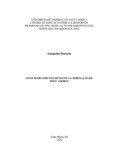| dc.creator | Pastorio, Anapaula | |
| dc.date.accessioned | 2021-08-10T18:25:31Z | |
| dc.date.available | 2021-08-10T18:25:31Z | |
| dc.date.issued | 2020-01-17 | |
| dc.identifier.uri | http://repositorio.ufsm.br/handle/1/21876 | |
| dc.description.abstract | Population aging cannot be neglected by society, which urgently needs to adapt to this new age
context, in which the elderly population increases exponentially, and their demands. This
dissertation was developed with the general objective of investigating the implementation of
the Transversal Topics for Teacher Training I course, which took place in 2019 at the Federal
University of Santa Maria (UFSM). This dissertation was divided into two articles. The first
presents an integrative review with the objective of identifying, based on the literature,
references found in the online research platforms, Latin American and Caribbean Center for
Health Sciences Information and Scientific Electronic Library Online, as gerontology has been
addressed in the educational context of Universities. The second manuscript deals with the
implementation of the Transversal Topics for Teacher Training I course in UFSM
undergraduate courses, in the light of the guidance proposed by the Ministry of Education
(MEC) in Resolution No. 02/2015, which brings with it the transversal theme : age groups, in
order to accompany the adaptation of Higher Education - in this case UFSM - to the current
social age context. As a result, the integrative review shows that the manuscripts in general are
limited to describing the creation of undergraduate courses in gerontology, such as the Federal
University of São Carlos, Pontifical Catholic University (PUC-SP), University of São Paulo
(USP) and / or characteristics of bachelor's gerontologists. The second article deals with the
recognition of the merits of UFSM by proposing itself as a pioneering institution with regard to
the adequacy of higher education to the Resolution proposed by MEC, referring to the
development of transversal themes in support of respect for social diversity initially in
undergraduate courses. Finally, in general, it should be stressed that efforts must be made so
that higher education prepares future professionals in a manner consistent with the social reality,
in which knowledge in the gerontological area is absolutely necessary. | eng |
| dc.language | por | por |
| dc.publisher | Universidade Federal de Santa Maria | por |
| dc.rights | Attribution-NonCommercial-NoDerivatives 4.0 International | * |
| dc.rights.uri | http://creativecommons.org/licenses/by-nc-nd/4.0/ | * |
| dc.subject | Artigos | por |
| dc.subject | Envelhecimento | por |
| dc.subject | Pirâmide etária | por |
| dc.subject | Articles | eng |
| dc.subject | Aging | eng |
| dc.subject | Age pyramid | eng |
| dc.title | O envelhecimento humano na formação de educadores | por |
| dc.title.alternative | Human aging in the training of educators | eng |
| dc.type | Dissertação | por |
| dc.description.resumo | O envelhecimento populacional não pode ser negligenciado pela sociedade, que precisa com
urgência adaptar-se a esse novo contexto etário e suas demandas, em que a população idosa
aumenta exponencialmente. A presente dissertação foi desenvolvida tendo como objetivo geral
investigar a implantação da disciplina Tópicos Transversais para a Formação Docente I,
ocorrida no ano de 2019 na Universidade Federal de Santa Maria (UFSM). Essa dissertação foi
dividida em dois artigos. O primeiro apresenta uma revisão integrativa com o objetivo de
identificar, com base na literatura, referências encontradas nas plataformas de pesquisa on-line,
Centro Latino-Americano e do Caribe de Informação em Ciências da Saúde e Scientific
Electronic Library Online, como a gerontologia vem sendo abordada no contexto educacional
das Universidades. O segundo manuscrito versa a cerca da implantação da disciplina Tópicos
Transversais para a Formação Docente I nos cursos de licenciatura da UFSM, à luz da
orientação proposta pelo Ministério da Educação (MEC) na Resolução n° 02/2015, que traz
consigo o tema transversal: faixas etárias, com o intuito de acompanhar a adaptação da
Educação Superior - nesse caso da UFSM - ao contexto etário social vigente. Como resultados,
a revisão integrativa evidencia que os manuscritos em geral, limitam-se a descrever a criação
dos cursos de graduação em gerontologia, como é o caso da Universidade Federal de São
Carlos, Pontifícia Universidade Católica (PUC-SP) e Universidade de São Paulo (USP), e
ainda, discutir as características dos bacharéis gerontólogos. O segundo artigo versa sobre o
reconhecimento dos méritos da UFSM ao se propor como instituição desbravadora no que
concerne a adequação do ensino superior à Resolução proposta pelo MEC, referente ao
desenvolvimento de temas transversais em apoio ao respeito à diversidade social inicialmente
nos cursos de licenciatura. Por fim, em âmbito geral cabe salientar ser imprescindível que
esforços sejam feitos para que o Ensino Superior prepare futuros profissionais de maneira
condizente à realidade social, em que os conhecimentos na área gerontológica são
impreterivelmente necessários. | por |
| dc.contributor.advisor1 | Acosta, Marco Aurélio de Figueiredo | |
| dc.contributor.advisor1Lattes | http://lattes.cnpq.br/6715907233036608 | por |
| dc.contributor.advisor-co1 | Cruz, Ivana Beatrice Manica da | |
| dc.contributor.referee1 | Confortin, Susana Cararo | |
| dc.contributor.referee2 | Leite, Marinês Tambara | |
| dc.creator.Lattes | http://lattes.cnpq.br/7462279276471509 | por |
| dc.publisher.country | Brasil | por |
| dc.publisher.department | Ciências da Saúde | por |
| dc.publisher.initials | UFSM | por |
| dc.publisher.program | Programa de Pós-Graduação em Gerontologia | por |
| dc.subject.cnpq | CNPQ::CIENCIAS DA SAUDE | por |
| dc.publisher.unidade | Centro de Educação Física e Desportos | por |



